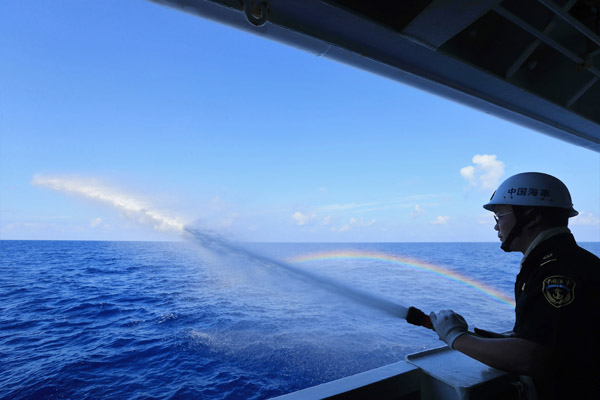US urged to halt close surveillance
By Zhang Yunbi (China Daily) Updated: 2016-05-20 02:34
 |
|
A sailor is taking part in the fire drill on the Chinese patrol vessel "Haixun 01" on April 8, 2016 in the South China Sea. [Photo/Xinhua] |
China urged the United States on Thursday to "immediately stop close-in reconnaissance actions" after confirming that a US Navy EP-3 spy plane had conducted close-in flights near China's Hainan Island on Tuesday.
Such spy flights have led to serious clashes and hurt bilateral ties before, including the collision in 2001 of a Chinese PLA Navy J-8 fighter jet and a US Navy EP-3 spy plane off China's Hainan Island that caused the death of Chinese pilot Wang Wei.
The Pentagon said in a statement on Wednesday that two Chinese fighter jets conducted an "unsafe" intercept of a US military reconnaissance aircraft over the South China Sea on Tuesday, Reuters reported.
Foreign Ministry spokesman Hong Lei said on Thursday, "We have information from the departments concerned, and what the US side has said is untrue."
As the US plane began close-in reconnaissance on Tuesday, two Chinese military airplanes "followed and monitored it in accordance with laws and regulations" and "maintained a safe distance" from it, Hong said. "China's operations subscribed to professional and security standards," he added.
"The US military warships and aircraft have conducted close-in reconnaissance with high frequency for a long time, posing a serious threat to China's maritime and airspace security," Hong said.
Observers said it is likely that Washington will continue its high-profile military presence in the South China Sea in the near future to maintain political pressure on China and bolster its overall regional strategy.
Zhang Junshe, a senior researcher at the PLA Naval Military Studies Research Institute, said the latest incident is part of US efforts to sustain tension in the region, and it is only natural for Chinese forces to verify and identify US planes and warships that are approaching.
"But the US has preferred blaming its provoked targets before the targets publicly react, and the US aircraft pilots tend to impose belligerence," Zhang said. "Such spy flights are one of the root causes of danger."
Zhao Xiaozhuo, a researcher at the Center on China-America Defense Relations at the PLA Academy of Military Science, said it is not likely that security issues involving the two countries can be tackled quickly. "The US toughness militarily is backed by domestic public opinion and congressional voices."







